Women farming in Ghor, located in the fertile Jordan Valley, say they have inherited their farming practices and connection to the land from their mothers and grandmothers. They have also inherited a climate crisis. Jordan is already the second most water-scarce country in the world – with every year, the region is getting hotter and drier, and experiencing more extreme weather patterns. These changes are forcing women farmers in Ghor to make adaptations to their farming practices – and they are calling for those in power to listen to their concerns.
Jamila Ashtiwi is a farmer and Director of the Museum at the Lowest Place on Earth and President of Al-Abata Women’s Association. She said that decreased rainfall and increasing competition for water over the last four years have affected what she farms and when. This means she is planting less water intensive crops such as bananas and citrus fruits, and is planting other crops – such as watermelons – later in the year, when she is sure that there will be rain to irrigate them.
“Every street receives water [from the municipality] twice a week… Before this, it was daily, so it’s changed a lot,” Ashtiwi said. “As women, we have a lot of patience. We wait, we endure.”
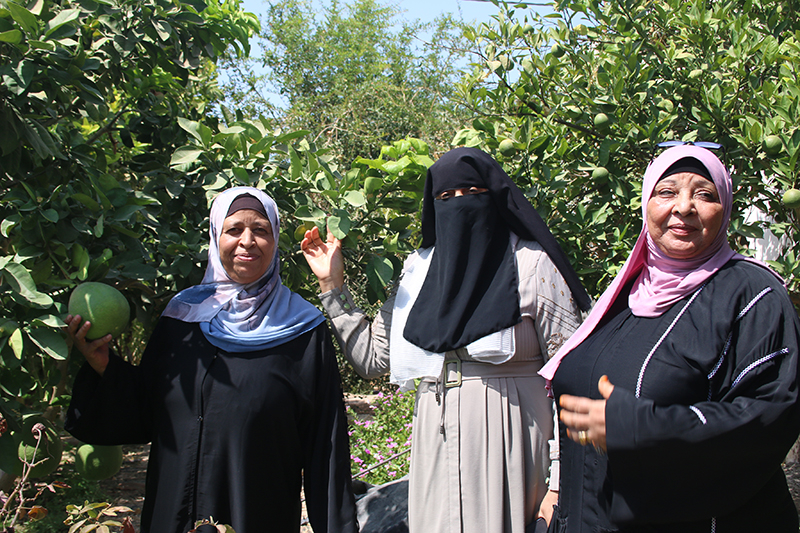
(From left) Aida Abdel Deissat, member of Karak municipal council, Naifeh Al-Nawasrah, President of the Ghor As-Safi Women's Association, and Jamila Ashtiwi, President of Al-Abata Women’s Association, stand among Abdel Deissat's citrus trees | Photo by Melissa Pawson
Their roles as farmers, and the subsequent climate adaptations they may make, are perceived as nothing particularly extraordinary by the women themselves. But Asma Suleiman Alashoush, President of the Ghor Women’s Association, thinks that many international interventions are blind to women’s active role in farming, when it comes to supporting women in rural areas. “Researchers or NGOs come to talk about women’s empowerment,” she said. “My friend, [farming] is what we are skilled in, this is our inheritance.”
According to Ruba Al-Zubi, green energy strategist and former Director of Policy and Development at the Ministry of Environment, women’s role in agriculture is often underestimated. “Women are already empowered. […] It is kind of in our DNA,” she said. Al-Zubi explained that if initiatives want to promote gender inclusion in climate action, then they should look beyond reductive notions of women’s empowerment, and focus instead on political participation.
Many international interventions are blind to women’s active role in farming, when it comes to supporting women in rural areas
“Climate change […] is a political issue,” said Al-Zubi. “So if women are not empowered politically, if they don’t understand the politics behind climate change, if they’re not part of a political scene, then they are more vulnerable, definitely.”
In 2022, Jordan ranked 155 out of 193 countries for its inclusion of women in national parliament – down from 131 in 2019. Currently, twelve percent of the seats in the House of Representatives are held by women. Electoral reforms in 2015 and 2016, and quotas for women introduced in 2003 and 2007 have given way for increased progress and inclusion for women in national and local government. However, the Organisation for Economic Co-operation and Development (OECD) and the Jordanian National Commission for Women (JNCM) have stated that “change is incremental,” and “women are still far from reaching parity with men in elected offices.”
Rates of education for Jordanian women are among the highest in the region, and more women are registered voters in Jordan than men. Despite this, OECD and JNCM’s report emphasises that there are a variety of obstacles, such as perceptions of women in leadership, and economic inequalities which present significant barriers to equal political inclusion. This is further exacerbated by “a clear divide between the urban elite and the rural poor,” according to the report.
For Al-Zubi, gender inclusion should be a priority – but not the only focus. “It is not only women, but also vulnerable groups, youth, people from outside the capital. All of these people need to be part of this […] we also have the refugees, and the host communities,” she said.
If women are not empowered politically, if they don’t understand the politics behind climate change, if they’re not part of a political scene, then they are more vulnerable
“Climate change is very contextual, so it really varies from one location to another, from one socio-economic standard to the other,” Al-Zubi said. This suggests a need for gender and climate strategies which are intersectional, and which ensure the inclusion of women across the entire cross-section of society.
The first step to creating intersectional climate strategies, explained Al-Zubi, is gathering better data. “We don’t have enough data to show the climate change related impacts, for instance on the economy, on social welfare,” she said. This information could help researchers better understand how climate change is impacting different populations, and in turn inform policy makers. Supportive gender and climate strategies may mean involving women in climate decisions, or integrating gender considerations into climate financing.
Decision-making power
Women’s lack of decision-making power in Jordan can be seen all the way from parliament to the farm. According to Naifeh Al-Nawasrah, a farmer and President of the Ghor As-Safi Women's Association, the majority of farm workers in Ghor are women, but most of those women do not own the land that they farm. “We’re the farm workers, but not the owners,” she said. This means that many female farmers often lack control over financial decisions, from investments to loans to how they sell and market their crops.
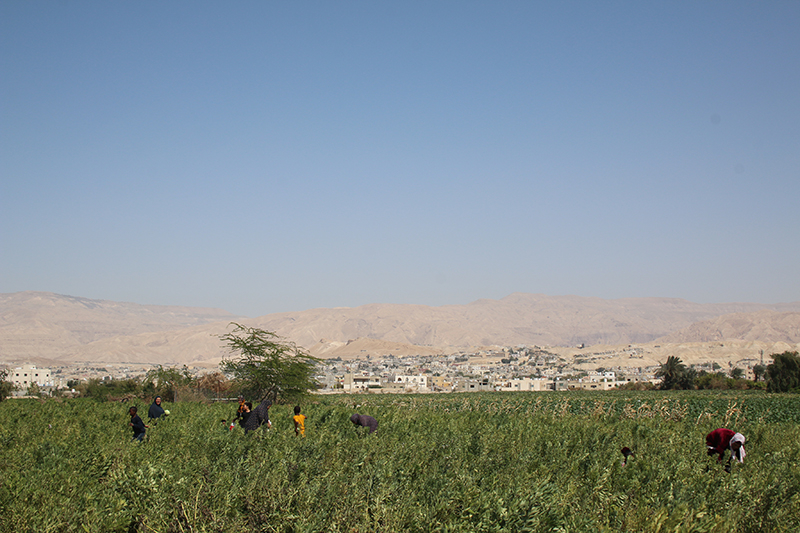
Corn harvest | Photo by Melissa Pawson
Al-Nawasrah added that most farm owners are in debt in the area, which has led many men – for whom work opportunities are somewhat more varied and available – to seek other employment. “It’s rare - only if [a man] had nowhere to go, he’d go into farming, but men have a lot of reluctance to go into farming,” she said. “Why would he want to farm if there’s no market?”
According to REACH and UN Women, many more women participate in Jordan’s informal agricultural workforce than men, which leaves them more economically vulnerable. Al-Zubi explained that this vulnerability extends to women across all sectors, and means that women – particularly those living in rural areas – are generally more likely to feel the effects of climate change. “If men are sitting alone and shaping [climate action policies], or if even people from the capital, from major cities are just shaping the climate change agenda, this is not fair,” she said. “We have to have what we call climate justice.”
Climate justice means recognising that climate change is a social issue, that it does not affect all people in the same way
Climate justice means recognising that climate change is a social issue, that it does not affect all people in the same way, and can even exacerbate social divides. Some advocates suggest that, in order to achieve climate justice, human rights, development and climate must all be addressed in conjunction with one another. Others point to the intrinsic links between the climate crisis, capitalism, and colonialism, and say that any effective response to climate change must recognise these connections.
While the Jordanian government has taken measures to support struggling farmers – including offering zero interest loans to those affected by the coronavirus pandemic and planning climate change adaptation programmes – both farmers and researchers say that more must be done.
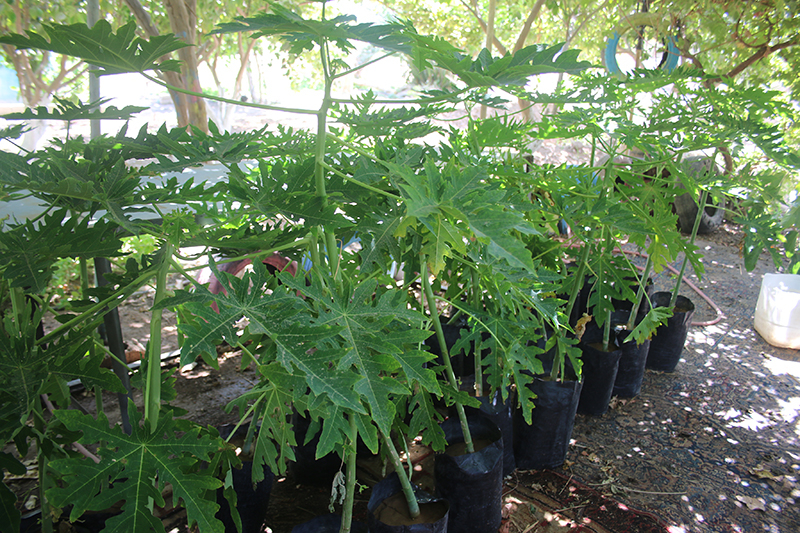
Water shortages forced women farmers in Jordan to grow fruit seeds they didn't use to before, such as papaya. | Photo by Melissa Pawson
With constant water shortages, and annual renewable water resources significantly below the threshold for severe water scarcity, adaptations to water scarcity are particularly needed. Attempted political solutions to the water crisis have included the conveyance of water up from the Red Sea to Amman, as well as costly national desalination projects – none of which have yet materialised. Last year, Jordan reached a deal with Israel, to purchase 50 million cubic metres of water, a move that was met with public controversy, as critics pointed out that the deal leaves Jordan dependent on Israel without providing a full solution to the country’s water problems.
“Water is going to be our main challenge in the future because the [water] crisis has been magnified by climate change,” said Al-Zubi.
“It’s an identity”
Aida Abdel Deissat, a farmer and member of Karak municipal council, said she believed that women should have a role in decision making, in climate issues and beyond. “It’s not just the woman’s role to start initiatives, her role is to make decisions. Decisions about planning, strategy, development, to create work opportunities,” she said.
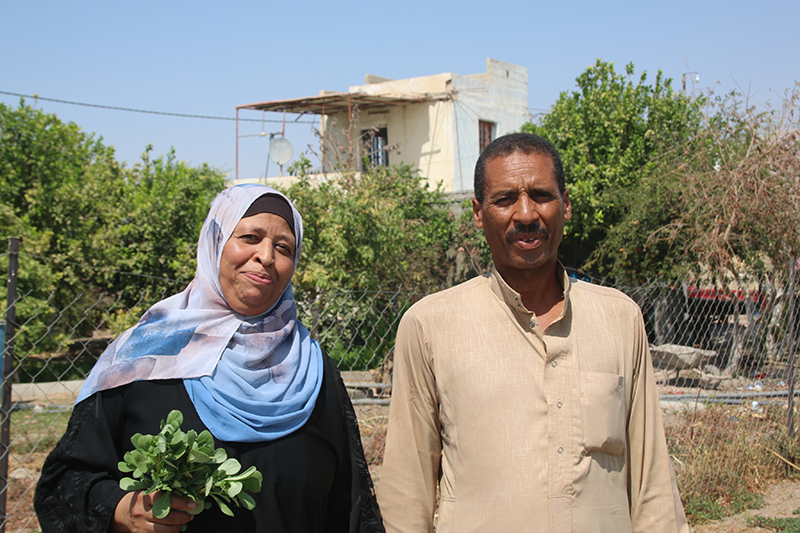
Aida Abdel Deissat and her husband stand in front of their farm in Ghor As-Safi | Photo by Melissa Pawson
“It’s the role of the media to spread and communicate the voice of rural women who live far away […] Because she’s important,” said Abdel Deissat. “I want to talk about farming […] because right now, I have a lack of water.” She said that because of this, she has had to change her farming practices, and is about to start planting papaya for the first time. “We’ve changed what we’re doing, we’re not just talking about it,” she explained.
Abdel Deissat, Ashtiwi, Al-Nawasrah, Alashoush and Al-Zubi are all daughters and granddaughters of women farmers. This inheritance has created a strong bond between the women and the land, and with it, a commitment to continue their farming practices.
While they might not label it as such, the women farming in Ghor are advocating for a kind of feminist climate justice
Ashtiwi explained that she tries to find sustainable methods – such as harvesting water in pools, and conserving water by changing what she plants – and that she does this in order to ensure the future of the land she works on. “It’s an identity, it’s love. If a person loves her identity, she should be able to keep this with her,” she said. “From my childhood, I saw my mother and father farming, how a woman works with the hoe, holds the hoe. It’s an interesting life.”
Ashtiwi added that she hopes one of her six children will take up farming in her place in the future, but even if they choose a different career path, their connection to the land will remain. “Even if they didn’t learn, their identity would stay in farming,” she said.
Ashtiwi’s work at the Museum at the Lowest Place on Earth has helped her to keep this connection to farming herself, even when she’s not on her farm. “My work with the ground led me to specialise in archaeology” she said. “In archaeology, you hold the trowel, so this is close to my work on the farm.” For her, farming is more than the work itself – it is about history, and about the earth which we all come from.
Farming is one of the few ways that these women can earn an income somewhat independently
While they might not label it as such, the women farming in Ghor are advocating for a kind of feminist climate justice. They see the links between climate justice, gender justice, health equity, economic justice and other movements against systemic inequality. Farming is one of the few ways that these women can earn an income somewhat independently. It is both a livelihood and an identity, passed down by a mother to her daughters. Therefore, the threat of climate change facing farms in Jordan is also a threat to the farmers.
In order to achieve feminist climate justice, it must be recognised that, if their farms dry up, these women cannot seek other work as easily as men. Supporting them in the face of the climate crisis would mean mitigating the impact of drought on their farms and creating avenues for other work opportunities. It must also be recognised that women – particularly rural women – are not sufficiently represented in the political debate. In order for their concerns to be known, they must be represented in politics, and included in decision making. As Abdel Deissat explained, women are ready to take tough decisions – but first, they must be listened to.


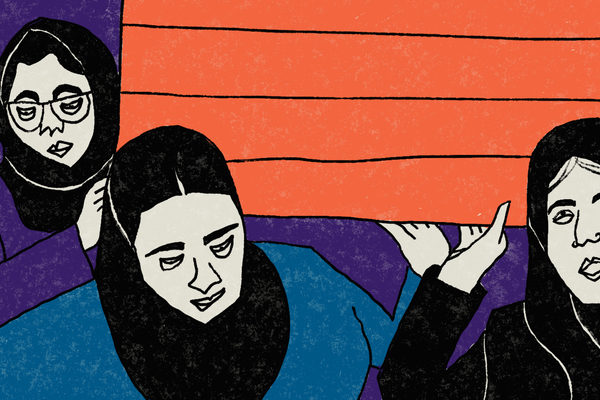
Add new comment